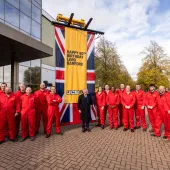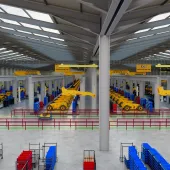New Generator Range from JCB

First published in the March 2015 issue of Quarry Management as The New Generation
JCB launch complete QS generator range plus world’s first intelligent hybrid generator and new secondary hybrid power solution
JCB Power Products have extended the QS range of generators to offer outputs from 22kVA to 220kVA – a power range that covers more than 70% of the market by volume. Available as both open and canopy sets, the company unveiled the first four-cylinder models during 2014 and subsequently added a smaller unit and a six-cylinder generator to complete the line-up and cover all power requirements.
JCB Diesel by Kohler
The G22QS, G30QS and G45QS compact models are powered by recently launched JCB Diesel by Kohler engines, all offering 500h service intervals and single-side service access. The engines drive Mecc Alte alternators and together with proven components from Deep Sea Electronics and Schneider, ensure high levels of reliability and efficiency.
The G22QS delivers 20kVA or 16kW prime output, the G30QS 26kVA or 20.8kW and the G45QS 41kVA or 33kW. The generators have been tested to operate in temperatures in excess of 45°C, and all three come with three-stage fuel filtration and can be run in a 60Hz configuration.
The compact yet robust canopy and base on these machines have been phosphate dipped and powder coated for maximum corrosion resistance and all three generator sets come with heavy-duty tie-down points, side-lift points and optional fork pockets for ease of movement.
The G22QS has a 53-litre fuel tank, while the G30QS and G45QS models come with a standard 81-litre tank for extended run times. Enhanced service access means that the fuel tank can be drawn out of the base by 30cm or fully removed for cleaning. A 110% capacity bunded base is available as an option.
JCB Dieselmax engines
The four mid-range QS generators, the G65QS, G90QS, G115QS and G140QS, have been joined by the G66QS, G91QS, G116QS and G141QS models powered by JCB’s four-cylinder Dieselmax Stage IIIA engine. The three smaller models use a 4.4-litre Dieselmax, while the G140QS is powered by the larger 4.8-litre 448 engine.
The G66QS offers 58.7kVA or 47kW of power output, the G91QS 80kVA or 64kW, and the G116QS 105kVA or 84kW, while the G141QS has a prime output of 125kVA or 100kW. Tested to operate in temperatures of more than 500C, the generators deliver a minimum 75% single load acceptance to cope with the most severe applications and demands.
Both the canopy and frame have been designed to withstand arduous operating conditions, yet remain compact and sturdy. Despite their compact dimensions, these units have a 285-litre fuel tank, permitting up to 12h of continuous operation.
Six-cylinder JCB Dieselmax
The most powerful flagship models in the QS range, the G165QS, G200QS and G220QS, are powered by JCB’s six-cylinder Dieselmax engine, which is said to deliver a 7% fuel saving over the earlier QX range and use up to 8% less fuel than competitive generators. The G165QS provides a prime output of 150kVA or 120kW, while the G200QS offers 180kVA or 144kW and the G220QS provides 200kVA or 160kW of power. As with the smaller models in the QS line-up, the option to operate at 60Hz, rather than the standard 50Hz 415V range, is available.
All three models have a 400-litre metallic fuel tank for 12h continuous use when running at 75% load. The tank can be fully removed for easy cleaning and a 110% capacity bunded base is available as an option.
LiveLink telematics
All generators in the QS range can be supplied with JCB’s LiveLink telematics monitoring and diagnostic system, which allows managers and owners to monitor equipment in real time remotely from the office. This helps prevent low fuel situations, ensures timely service work can be scheduled and also acts as a tracking unit/theft deterrent, warning customers of unplanned movement of machinery.
LiveLink also allows fleet managers to access the load history of a particular generator, to determine how efficiently the machine is being used. It provides information on how long the generator has been run at light loads and when fully loaded, to help the customer determine how effective the generator is in a particular application. The system also provides access to phase load information, so it can be monitored and recorded to show the loading of a specific phase.
World’s first hybrid generator
JCB Power Products have also developed the world’s first intelligent hybrid generator, to meet a range of off-grid power requirements. Generators are specified to meet the peak load requirement of an application, yet off-grid sites often face significant changes in load requirement throughout the day, leading to inefficient running of the generator and excessive fuel use.
Based on the QS generator range, the new JCB Inteli-Hybrid features a series of high-capacity, deep-cycle battery cells that are stored in the base of the unit. These are charged by the generator during periods of higher load when the engine is running at its most efficient output. During periods of low load, the engine can be stopped and the batteries continue to supply the power, thereby increasing efficiency (much like an automotive stop/start system), reducing fuel consumption and cutting emissions.
Typically, a 100kVA generator on a construction site will use up to 120 litres of fuel per day running at low load, creating up to 340kg of carbon. By turning the engine off for up to 10h in a 24h period and relying on battery power instead, a customer could potentially save up to 40 litres of fuel per day, with a commensurate reduction in emissions.
In addition, while the generator is operating on battery power (potentially through the night-time period), there are no noise emissions, making the Inteli-Hybrid particularly suitable for use on urban and city sites. The reduction in engine running time also extends the regular service period, cutting maintenance costs and reducing cost of ownership.
The base unit of the JCB Dieselmax-powered Inteli-Hybrid generator has the same footprint as the standard QS machine but contains 24 battery cells connected to a high-power inverter unit. The inverter converts the stored energy within the batteries into a 230V 50Hz, or 220V 60Hz, AC supply. The batteries are charged using three internal charger units but can also be charged using a mains supply, via a separate input socket, for low-cost charging and conditioning.
The battery system has also been installed with the potential to integrate renewable energy sources, such as wind and solar, in the future. This will further decrease the running costs of the generator sets as alternative energy sources become more readily available. The sealed gel batteries require no regular maintenance and built-in cooling fans minimize heat build-up during charging.
JCB’s LiveLink telematic system is supplied as standard on the hybrid generator, allowing fleet managers to access the load history of engine and hybrid battery use to determine how efficiently the machine is being used. It provides information on how long the generator has been run at light loads on battery power and fully loaded through the diesel engine, and in the future will demonstrate how much energy has been provided by renewables.
JCB Battery Box
JCB Power Products have also developed a new secondary hybrid power solution that can be used to significantly improve generator efficiency, providing power in low-load periods to allow generators to be turned off, thereby conserving fuel and reducing carbon emissions. The JCB Battery Box is compatible with all sizes and makes of generator and with mains supply electricity, allowing it to be efficiently charged on site.
Packaged in a robust steel canopy, the Battery Box delivers up to 10kVA continuous power output with a 20kVA peak and is available in both 50Hz and 60Hz configurations. As it has zero emissions, the power pack can be used indoors or in sensitive applications. The batteries have cooling fans to blow air across the cells and the maximum depth of discharge can be set between 30% and 50% to prolong battery health.
For further information visit: www.jcb.com
- Subscribe to Quarry Management, the monthly journal for the mineral products industry, to read articles before they appear on Agg-Net








